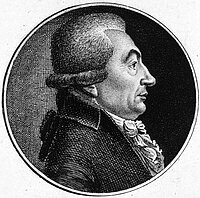Carl Caspar von Siebold, Physician
* November 4, 1736 in Nideggen
† August 3, 1807 in Würzburg
In 1752, at the age of 16 Siebold studied philosophy in Cologne. In 1754, he completed his studies and obtained his doctorate. After returning home, he was trained to be a surgeon by his father and practiced in several military hospitals from 1757. In 1760, he accepted a job at the Würzburger Juliusspital and studied medicine until 1763. At the command of the Würzburg prince-bishop, this was followed by study trips to France, Great Britain and the Netherlands – he returned in 1766. In 1769, he earned a doctorate in medicine and was appointed as professor of anatomy, surgery and obstetrics. He stayed in Würzburg until his death in 1807.
Siebold’s great achievement was the successful integration of surgery into the university medical studies. From then on, surgeons had to take a state examination in order to be able to practice which massively raised their educational level as well as the quality of surgical treatments. Due to his efforts to modernization the Faculty of Medicine of the JMU came to new fame. In 1801, he was awarded an inheritable title of nobility which started the famous Würzburg dynasty of physicians.
His former home was at Theaterstraße 8.




![[Translate to Englisch:] Nobelpreis Röntgen Ausschnitt](/fileadmin/_processed_/8/4/csm_Nobelpreis_Ausschnitt_cbf91ddcc5.jpg)

